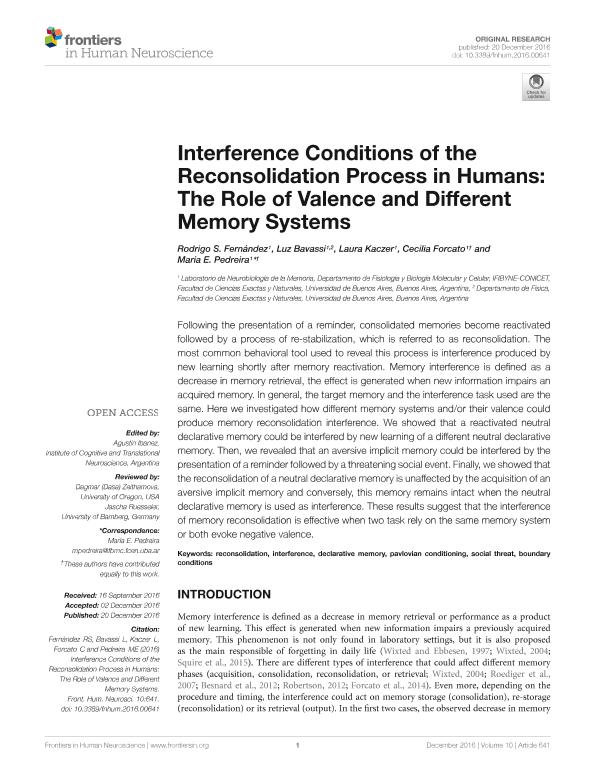Artículo
Interference Conditions of the Reconsolidation Process in Humans: The Role of Valence and Different Memory Systems
Fernández, Rodrigo Sebastián ; Bavassi, Mariana Luz
; Bavassi, Mariana Luz ; Kaczer, Laura
; Kaczer, Laura ; Forcato, Cecilia
; Forcato, Cecilia ; Pedreira, Maria Eugenia
; Pedreira, Maria Eugenia
 ; Bavassi, Mariana Luz
; Bavassi, Mariana Luz ; Kaczer, Laura
; Kaczer, Laura ; Forcato, Cecilia
; Forcato, Cecilia ; Pedreira, Maria Eugenia
; Pedreira, Maria Eugenia
Fecha de publicación:
12/2016
Editorial:
Frontiers Research Foundation
Revista:
Frontiers In Human Neuroscience
ISSN:
1662-5161
Idioma:
Inglés
Tipo de recurso:
Artículo publicado
Clasificación temática:
Resumen
Following the presentation of a reminder, consolidated memories become reactivated followed by a process of re-stabilization, which is referred to as reconsolidation. The most common behavioral tool used to reveal this process is interference produced by new learning shortly after memory reactivation. Memory interference is defined as a decrease in memory retrieval, the effect is generated when new information impairs an acquired memory. In general, the target memory and the interference task used are the same. Here we investigated how different memory systems and/or their valence could produce memory reconsolidation interference. We showed that a reactivated neutral declarative memory could be interfered by new learning of a different neutral declarative memory. Then, we revealed that an aversive implicit memory could be interfered by the presentation of a reminder followed by a threatening social event. Finally, we showed that the reconsolidation of a neutral declarative memory is unaffected by the acquisition of an aversive implicit memory and conversely, this memory remains intact when the neutral declarative memory is used as interference. These results suggest that the interference of memory reconsolidation is effective when two task rely on the same memory system or both evoke negative valence.
Palabras clave:
Reconsolidation
,
Interference
,
Memory
Archivos asociados
Licencia
Identificadores
Colecciones
Articulos(SEDE CENTRAL)
Articulos de SEDE CENTRAL
Articulos de SEDE CENTRAL
Citación
Fernández, Rodrigo Sebastián; Bavassi, Mariana Luz; Kaczer, Laura; Forcato, Cecilia; Pedreira, Maria Eugenia; Interference Conditions of the Reconsolidation Process in Humans: The Role of Valence and Different Memory Systems; Frontiers Research Foundation; Frontiers In Human Neuroscience; 10; 641; 12-2016; 1-17
Compartir
Altmétricas



